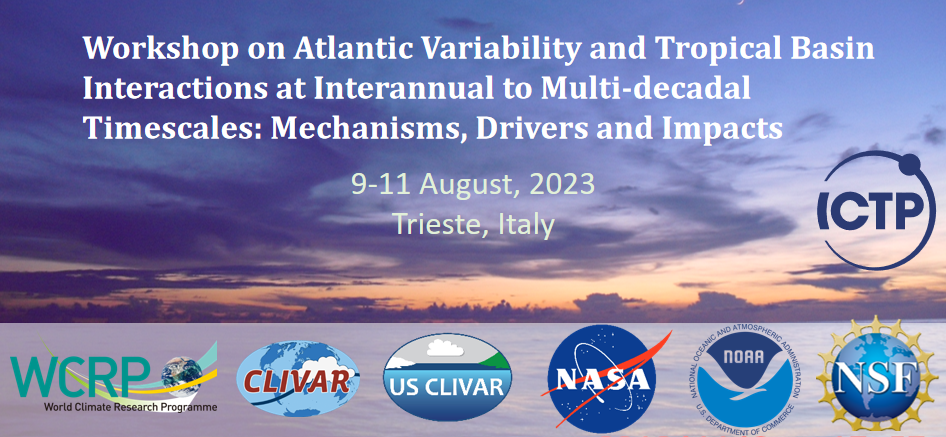Workshop on Atlantic Variability and Tropical Basin Interactions at Interannual to Multi-decadal Timescales: Mechanisms, Drivers and Impacts
Atlantic Variability and Tropical Basin Interactions at Interannual to Multi-decadal Timescales: Mechanisms, Drivers and Impacts

Draft Programme is available!
Description
Tropical ocean basins do not vary in isolation but influence each other on seasonal and longer timescales. It is long known that the El Niño Southern Oscillation influences the tropical Atlantic and Indian Oceans on interannual timescales, and there is increasing evidence that the reverse occurs. On longer timescales, variations in Atlantic sea-surface temperature (SST), such as the Atlantic multi-decadal variability (AMV), can drive changes in the tropical Pacific and Indian Oceans via atmospheric teleconnections, even modulating global warming. Despite the importance of AMV and tropical basin interaction (TBI) in modulating regional and global weather and climate, large uncertainties still exist about its governing mechanisms. Changes in external forcing (e.g., aerosols) and internal variability (e.g., the Atlantic Meridional Overturning Circulation (AMOC) and the North Atlantic Oscillation), as well as dynamical and thermodynamical ocean-atmosphere feedbacks, have been proposed as possible mechanisms and sources of predictability.
The aim of this workshop is to explore four fundamental questions:
- What controls tropical basins interactions (TBIs) at different timescales and their modulation;
- What is the relative role of AMOC in setting AMV spatial patterns and timescale;
- How do climate models simulate the AMV/AMOC interaction and TBIs and
- how do AMV/AMOC and TBIs evolve in a warming climate.
The Research Focus on TBI, in collaboration with several modeling groups, is currently developing the experimental protocol for multi-model coordinated experiments to study TBI. These experiments include (1) pacemaker experiments for each tropical basin with SSTs being restored to observations for the period 1870-present; (2) pacemaker hindcast simulations, which are a combination of hindcast simulations and pacemaker simulations. By summer 2023, results from these simulations will be available to analyze. At least some of these simulations will be presented at the workshop to isolate the role of individual basins in determining the variability of the climate in other ocean basins and mid-high latitudes.
The objective for this workshop is to build the relationship among participants and exchange ideas on how to proceed with the research focusing on those 4 questions. We note that this workshop will be held immediately after ITCP summer school on the same subjects (pending approval of ITCP funding), and we expect that many of the lectures and participants of the summer school will attend the workshop.
The workshop will be organized in conjunction with the 4th Summer school on Theory, Mechanisms and Hierarchical Modeling of Climate Dynamics: Atlantic Variability and Tropical Basin INteractions at Interannual at Interannual to Multi-Decadal Time Scales.
Time
Starts 9 Aug, ends noon of 11 August, 2023. Central European Time.
Venue
International Centre for Theoretical Physics (ICTP), Trieste, Italy.
Registration
The workshop shares the same registration portal with the summer school, please go to this page for registration: https://indico.ictp.it/event/10198/
Format
Invited/keynote presentations that will cover the aims of this workshop regarding TBI and the role of AMV/AMOC in modulating these interactions
Contributed presentations will be assigned to plenary sessions of interest to the whole community, or to more specialized topics presented in breakout sessions.
Breakout groups to promote interactions, exchange of ideas and perspectives, and a vision for how to move forward.
Day 1:
AM: Welcome and plenary session on question 1: What controls tropical basins interactions (TBIs) at different timescales and their modulation
PM1: plenary on question 2: What is the relative role of AMOC in setting AMV spatial patterns and timescale
PM2: plenary on question 3: How do climate models simulate the AMV/AMOC interaction and TBIs
Evening: an icebreaker event to facilitate informal discussions.
Day 2:
AM1: plenary on question 4: how do AMV/AMOC and TBIs evolve in a warming climate
AM2: breakout session for questions 1 and 2
PM1: breakout session for questions 3 and 4
PM2: poster session
Day 3:
AM1: report of the breakout sessions and discussion
AM2: Future directions
Draft programme is available here.
Scientific Organizing Committee
Ingo Richter (JAMSTEC, Japan, co-chair)
Riccardo Farneti (ICTP, Italy, co-chair)
Aixue Hu (NCAR, US, co-chair)
Natalie Burls (George Mason University, US)
Sarah Kang (Ulsan National Institute of Science and Technology, South Korea)
Noel Keenlyside (University of Bergen, Norway)
Yuko Okumura (University of Texas at Austin, US)
Rhys Parfitt (Florida State University, US)
Co-Sponsors












Add new comment